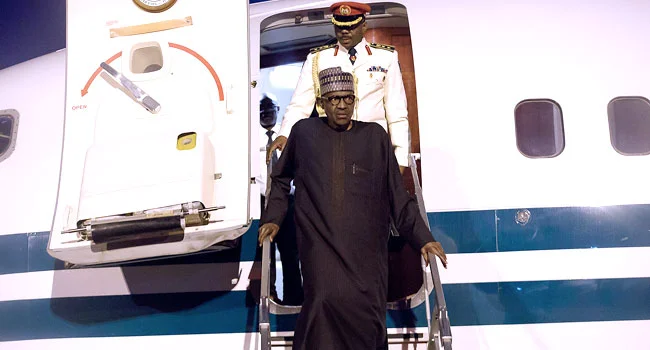President Muhammadu Buhari (retd.) will embark on a six-day trip to London starting Friday, marking his first foreign visit of 2020, as announced by the State House.
The President will participate in the inaugural UK-Africa Investment Summit, hosted by British Prime Minister Boris Johnson, which begins on Monday, January 20. Buhari is expected to return to Nigeria on Thursday.
The summit aims to foster new partnerships between African leaders, business executives, and international organization heads to boost investments and create jobs, benefiting both the UK and Africa.
Focus of the Summit
The event will explore new perspectives on the UK-Africa Partnership for Prosperity, with key discussions on Sustainable Finance and Infrastructure, Trade and Investment, Future African Growth Sectors, and Clean Energy and Climate.
With the African Continental Free Trade Area (AfCFTA) set to launch mid-2020, the summit offers Nigeria a chance to position itself as a prime investment hub for new industries.
It also seeks to strengthen Nigeria-UK ties post-Brexit, noting that Africa accounts for just 2% of British trade, with Nigeria contributing 10% of that share.
The Nigerian delegation will highlight government policies and legislation aimed at enhancing the country’s business climate.
Additional Engagements
Beyond the summit, Buhari will meet with Prince Charles, Head of the Commonwealth, in Glasgow, Scotland, and hold bilateral talks with Johnson and heads of multilateral organizations.
His entourage includes Governors Yahaya Bello (Kogi), Muhammad Inuwa (Gombe), and Okezie Ikpeazu (Abia), alongside key ministers—Geoffrey Onyeama (Foreign Affairs), Otunba Niyi Adebayo (Industry, Trade and Investment), and Zainab Ahmed (Finance, Budget and National Planning)—as well as National Security Adviser Babagana Monguno (retd.) and National Intelligence Agency Director-General Ahmed Rufai Abubakar.
Significance and Expectations
This trip underscores Nigeria’s intent to leverage international platforms to attract investment and address economic priorities.
While the summit promises opportunities, some question whether the focus on trade will translate into tangible benefits for Nigerian citizens, given past challenges in implementing such agreements.
The inclusion of security and intelligence officials suggests a broader agenda, possibly touching on regional stability, though details remain limited. As the event unfolds, its outcomes will be closely watched for their impact on Nigeria’s economic landscape.






